Iole Damaskinos asks why we deserve the coveted Blue Flag award for so many of our beaches when they are devoid of marine life and awash in plastic
And just like that we find ourselves in the throws of another Mediterranean summer. Many, if not most of us, are donning our hats and shades, tossing that book we’ve been meaning to read for over a year into a bag along with our sun lotion, and sashaying off to the beach to break in squeaky new flip-flops and chill. Having lived abroad for a great many years, now repatriated for eight, I have to say this still my absolute favourite part of belonging here–us Cypriots are so spoilt for choice of stunning beach venues that we don’t even know it.
When I was newly repatriated, beach jaunts were pure unadulterated delight. Over time, however, a shadow has started to creep in and interfere with this bliss.
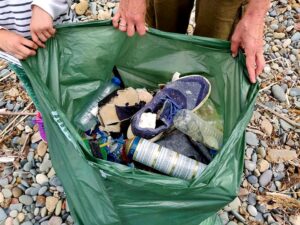
Items picked up from a beach
Maybe it started with noticing the piles of plastic straws and frappé cups spilling out of miniature rubbish bins in Ayia Napa, or the fact that the water left me perfumed with other people’s sun-lotion. Perhaps it was the time in Larnaca when my middle child decorated her sand-mermaid with a necklace made up entirely of cigarette butts.
Maybe it was when, keen to show my kids the underwater wonderworld I remembered growing up, I took them snorkeling to a lesser-known beach in Paphos, only to find emptiness, not one sea-urchin, and instead broken up bits of plastic suspended all around us in the water and all kinds of other detritus buried where life had once been. Or perhaps it was the day I found a toilet brush, a mobile phone, and dentures washed up on the shore while taking a winter beach walk. It is hard to describe the feeling of catastrophe and loss brought on by these incidents, but imagine it something like returning after years to a dearly beloved face, to find it horrifically scarred.
Ever since then I’ve been trying to get a handle on the situation. Since most people around me seem oblivious to the change, managing to blithely enjoy the whole summer beach carnival, sipping cheerfully from plastic frappé cups embellished with brightly coloured plastic straws (while I, being a sour puss, refuse to order anywhere unless they are willing to make my drink in my reusable cup, much to my family’s embarrassment), I ask myself, “Am I just out of touch? Is the situation really as bad, as apocalyptic, as it feels to me? Are the hordes of tourists, the plastic deluge, the continuation of business-as-usual just something to be shrugged at and accepted?”
In my search for uneasy peace, I interviewed someone committed to protecting our seawaters and beaches. Dr Michael Ierides is the president of the Cyprus Marine Environmental Protection Association (Cymepa), who heads up the Blue Flag Beach Awards programme. The Blue Flag programme, which has been running in Cyprus for 25 years, is a voluntary quality-assurance programme in which municipalities can participate. Started in France in 1985, it has been implemented in Europe since 1987 and in areas outside the EU since 2001 when South Africa joined.
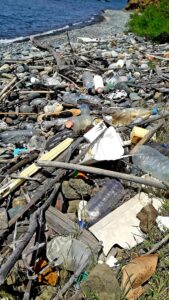
Plastic bottles and other items lay strewn on the shore
A participating beach must fulfill a number of stringent criteria to be awarded the ‘Blue Flag’, including the promotion of sustainable recreation and tourism in the area, environmental education, displaying water quality, and a detailed list of safety features
such as a lifeguard station.
Viewed as an eco-label, the Blue Flag Beach award, Dr Ierides assured me, is prestigious and well-respected. Regular water quality inspections are carried out using top methods for detection of intestinal enterococci and Escherichia coli. Water inspection is done on a regular basis to test for these nasty bacteria found in human fecal matter that can cause serious harm to our health. (There are state inspections in place, by the way, to inspect other beaches, just not as frequently).
Somehow, I still didn’t feel reassured.
Especially when arguably, this is something municipalities actually have the least level of control over. In the north sewage spillage into the sea is almost something of a regular occurrence.
What about other water pollutants? What about the cruise ships in Limassol, I asked. Do they pollute? Cruise-ships, Dr Ierides assured me, have gotten a bad rep for no valid reason. In fact, cruise ships are the most strictly controlled of all seaborn vessels around the island. Upon arrival into Cypriot territorial waters these ships automatically have to pay management companies for the proper collection and disposal of their sewage. They have absolutely no incentive to pollute as they have to pay regardless.
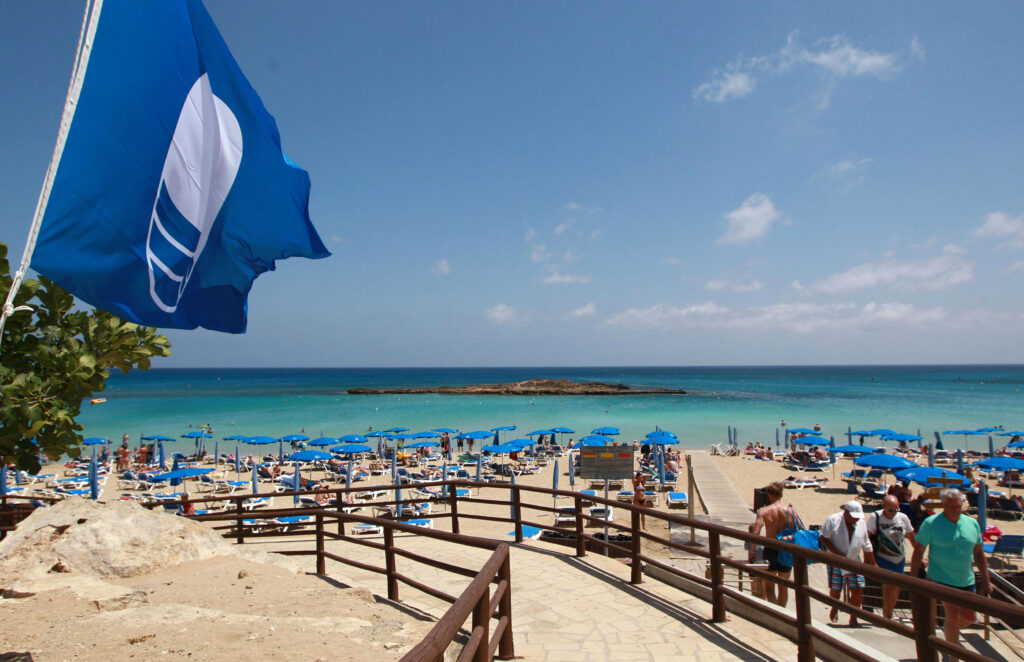
Fig Tree bay in Protaras is one of those awarded a Blue Flag status
Moreover, Dr Ierides continued optimistically, the new drive towards decarbonisation in the shipping industry has meant that innovative low carbon footprint fuels are being used by these ships, with even cleaner ones envisioned in future, so air born pollutants will be even further reduced.
What though about oil spillage from engines, I asked? “We have no dry docks for such ships in Cyprus,” Dr Ierides told me. “The nearest dry docks are in Egypt,” and this is where cleaning of engines would happen. Even then, special “designated areas” are used to clean out the engines, and any oil spilled is actually recovered, because “oil is precious,” he added.
But what about all the smaller local sea craft, I persisted? Without becoming committal, Dr. Ierides conceded that smaller vessels, including small cruise ships and yachts, may not be as strictly regulated and that it is possible they are likely to be responsible for some minor pollution.
“But the sea does have the capacity to reabsorb things,” he said.
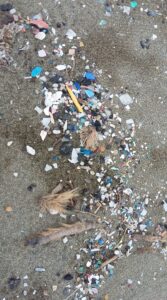
Microplastics on the beach
Somehow the fact of knowing that we are not swimming in sewage, just a watery desert of microplastics and a tiny bit of oil, does not make me feel better. What about over fishing? Alien species invasion? And what about the lauded offshore drilling for natural gas? On which cognitive shelf do I file the possible methane leaks and other environmental fall out from that? Is it possible that the Blue Flag eco-label, which promotes a perception of excellence in marine sustainability and beach management, does the public a disservice by obscuring the other major whales-in-the room facing the Mediterranean?
Sure, we can clean up our beaches ahead of the tourist season but the skeletons in the closet remain. My unpleasant, nagging feeling, that we are somehow being duped remained. I was unable to put a finger precisely on it, until one morning, swimming with my nine-year-old, she started excitedly beckoning me over babbling incomprehensively though her snorkel. When I caught up to her, I made out what she was saying: “Mum, sea urchin, SEA URCHIN!” There indeed in the clear shallow waters, on an almost barren rock, was wedged one lone sea urchin.
And then it hit me. There is an eco-psychological phenomenon which has been dubbed “generational amnesia”. Basically, it refers to the fact that for each generation, what they see around them becomes their baseline reference. In the UK it has been associated with the murmuration of starlings, once a common sight, now less and less so. Younger generations don’t have the memory of what the natural world used to be like, so they don’t miss it. And so for each successive generation the impoverished biodiversity around it feels like the norm, perhaps even “rich”.
This is what was happening here and why I find the self-congratulatory Blue Flag advertising so disturbing and hard to endorse. My kids don’t know the sea isn’t supposed to be full of plastic bits. They don’t know that one lone sea urchin is something to sob, not rejoice, about. Well, they sort of know, they’ve been told, but they’ve never experienced it. And what of my grandchildren? Perhaps they will never know that the sea was once something you could delight in, cool off in, and safely swim in. Maybe for them the sea will be just something you go visit to look at, while your parents force you to read the informational plaque, like the impressive deep pits left behind from abandoned mines and quarries.

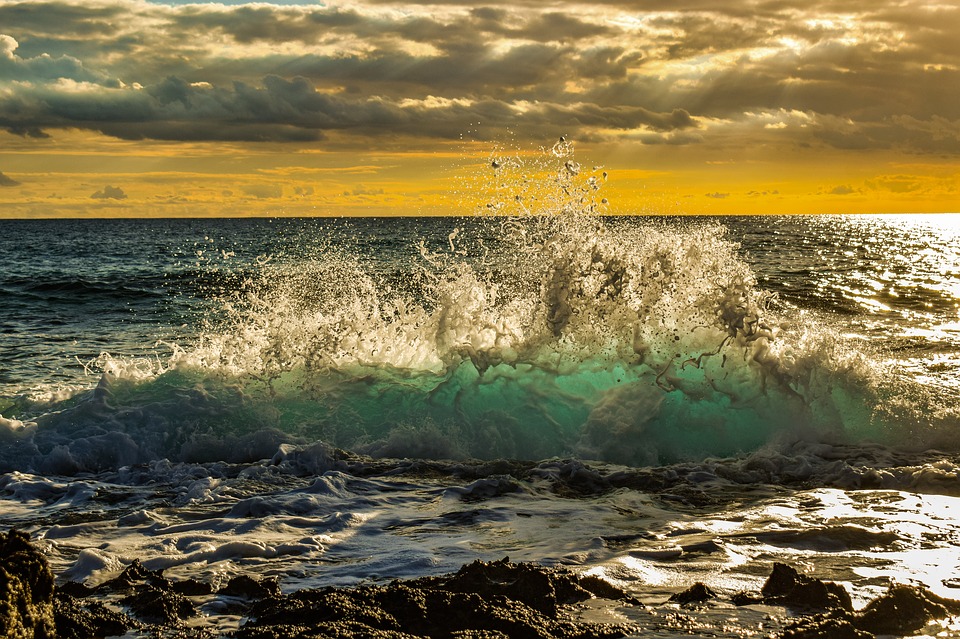





Click here to change your cookie preferences